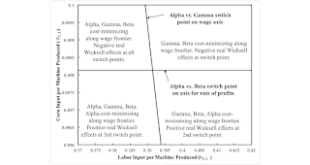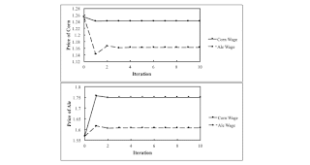Figure 1: A Part of the Parameter Space1.0 Introduction This post presents a perturbation of an example from Salvatore Baldone. It follows the style of some posts that almost add up to a draft research paper. A widespread view among Austrian-school and mainstream economists is mistaken. Given competitive markets, if the supply of capital were increased, in some sense, the rate of profits would supposedly be driven down. At the level of abstraction here, no distinction exists between the...
Read More »Leontief On Reswitching
An old puzzle is why do those who build on Leontief's empirical work not make more of Sraffa? And why do those who build on Sraffa's theory not interact more with those building on Leontief? Sraffa implicitly refers to Leontief, von Neumann, and others in the preface to his 1960 book. Those, like Zambelli, that have done empirical work on capital-theoretical 'paradoxes' draw on Leontief matrices constructed from national income and product accounts. So do those who are exploring empirical...
Read More »Is Socialism Possible?
The strongest argument against socialism, understood as entailing central planning, comes from Enrico Barone. Von Mises popularized this argument. Maybe he was subjectively original. I think von Mises did not have a good understanding of duality theory and shadow prices. Anyways, his argument is supposed to be an argument in principle, an impossibility argument. Oskar Lange, Abba Lerner, and Fred Taylor, for example, provided answers. Hayek proposed a revision emphasizing practicality and...
Read More »What Are Prices Of Production?
Suppose one rejects the labor theory of value as a theory of prices. Or, even more, one could reject Marx's theory of value in volume 1 of Capital. Still, one could elaborate the theory of prices of production. In my published works, I have tried to extend the theory a step or two. And the theory of prices of production is opposed to a marginalist theory, a theory of supply and demand, if any such coherent theory exists. In this post, I offer one explanation of the setting of the theory...
Read More »A Letter From Marx To Engels In 1867 On The Order Of Presentation In Capital
This is another letter in a series I have been transcribing in which Marx explains his theory to Engels. In 1867, he was going through the proofs of Capital and so penned several such letters. I think one can ignore Hegel and read Marx as presenting a scientific theory, from abstract principles to more concrete applications. I would not necessarily disagree with those who think such a reading misses much. But I find it interesting how much this reading captures. I like that in this...
Read More »Daniel Ellsberg (1931 – 2023)
I find that I summarized the Ellsberg paradox back in 2009. I have also commented on who in the United States was prosecuted for leaking classified information to the press. Eric Loomis has an obituary. The Pentagon Papers are now unclassified and available from the National Archives. As I understand it, Ellsberg copied each page personally - no downloading to a thumb drive in his day. David Halberstam's book, The Best and the Brighest is a well-known work of journalism (the first draft of...
Read More »Elsewhere
Isabella Weber's Sellers' inflation, profits and conflict: why can large firms hike prices in an emergency?, in the Review of Keynesian Economics. Isabella Weber et al Inflation in times of overlapping emergencies: systemically significant prices from an input-output perspective, a working paper. Zachary Carter's profile of Isabella Weber in the New Yorker. Noah Smith's muddle and more muddle. Zachary Carter has a book, The Price of Peace: Money, Democracy, and the Life of John...
Read More »A Iterative Procedure Converging To Prices Of Production
Figure 1: Prices of Corn and Ale in an Iterative Process1.0 Introduction Anwar Shaikh proposed, sometime in the 1970s, I guess, an interpretation of Marx's transformation problem. Marx's solution in volume 3 of Capital is the first step of an iterative process. I thought I might work through this idea with an example from an old exposition of mine. I am not sure how faithful I am to Shaikh's approach. I notice that as I explain it, the equality of total values and of total prices is...
Read More »Marx To Vera Zasulich In 1881
Is historical materialism a deterministic theory? Must all societies (in particular, Russia) go through the same stages, including feudalism, capitalism, and, eventually, socialism? Perhaps Marx says otherwise in the following letter. London, 8 March 1881 41 Maitland Park Road, N.W. Dear Citizen, A nervous complaint which has assailed me periodically over the last ten years has prevented me from replying any sooner to your letter of 16 February. I am sorry that...
Read More »A Letter From Marx To Engels In 1862 On The Transformation Problem
Here Marx sets out the transformation problem in a letter to Engels. The first volume of Capital was published in 1967. So this is another instance of Marx distinguishing labor values and prices of production before publication of Capital. This post is the second in a series I am working on in which he sets out critical parts of the (critique of) political economy in Capital in letters to Engels. As I understand it, the concept of absolute rent was original with Marx. Marx criticizes...
Read More » Robert Vienneau: Thoughts Economics
Robert Vienneau: Thoughts Economics


